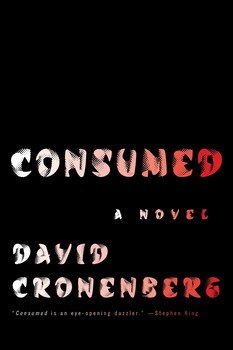September 30, 2014
David Cronenberg becomes novelist; other directors decide to pull a Cronenberg
by Mark Krotov
Decades from now, you’ll probably be asked where you were the day David Cronenberg’s debut novel was published. Naturally, there will only be one right answer to this question: “reading a MobyLives post about David Cronenberg’s debut novel.” That’s because when it comes to debut novels by acclaimed directors, this blog is the only news source that matters.
A connoisseur of violence, brutality, and grotesquerie—all of which are banned in Canada, where he was born—David Cronenberg has been making dark and weird masterpieces since the late 1960s. And while he has directed films based on novels—including such conventional, mainstream, user-friendly books as William Burroughs’s Naked Lunch, J.G. Ballard’s Crash, and Don DeLillo’s Cosmopolis—he had never actually written one himself until Consumed, which is out today from Scribner.
Your humble correspondent has not yet, um, consumed Consumed, but can report that, according to the publisher, the book features “a gripping, dreamlike plot that involves geopolitics, 3-D printing, North Korea, the Cannes Film Festival, cancer, and, in an incredible number of varieties, sex.” This is such a Cronenbergian plot description that it might as well be his version of the Aristotelian unities. 3-D printing? Of course, 3-D printing. Oh, and this is how Jonathan Lethem ended his review of the book in Sunday’s New York Times Book Review: “Ever considered the erotic potential of hearing aids? Consumed has.” This counts as one of the Book Review’s more definitive assessments in recent memory.
But Consumed has done more than provoke middle-aged writers to take an interest in the sexual possibilities of medical equipment—though that certainly would have been enough. The book has also inspired a number of other contemporary directors to try their hand at novel-writing. Below is MobyLives’s exclusive report on three new novels by acclaimed filmmakers, all of whom are rushing to follow in Cronenberg’s footsteps.
The Parrot Orchard, Vienna, 1907
In this surreal and often touching work of whimsy from The Grand Budapest Hotel director Wes Anderson, a large Viennese clan—distant relatives of Otto and Ida Bauer—gathers at their estate off the Ringstrasse to divide up patriarch Max Bloch’s extraordinary collection of parrots. Set over the course of twenty-four hours, The Parrot Orchard, Vienna, 1907 is an intricately crafted, multivocal vision of a forgotten age.
The Beheadings
A radical work of what director Kathryn Bigelow has called truthfiction, The Beheadings is, like every great novel ever written, ripped straight from the headlines. Bigelow’s account of the latest wave of turmoil in the Middle East seems at first to be a cold and clinical novel about an American soldier fighting to infiltrate ISIS, using nothing but a superior sense of morality and an infinite amount of military technology to accomplish her task. But as this slick, tightly crafted novel unfolds, we learn that this is actually a sly, subversive work that’s interrogating the Tom Clancy formula it hews to with such rigorous conviction. Like every great novel ever written, The Beheadings possesses a subversiveness so subtle that it is essentially undetectable.
A Drift, Adrift
Throughout a long and diverse career, Jim Jarmusch has been praised most consistently for his low-key, early films about men, women, cigarettes, hats, silence, confusion, and ineloquence. A Drift, Adrift is the thrilling novelistic encapsulation of all of Jarmusch’s trademarks. A man, named A Man, sits in an empty bar and smokes cigarette after cigarette before embarking on a journey that will take him nearly two miles down the road. Boldly laconic, this novel confirms that Jarmusch’s ability to convey stasis is hardly limited to the screen.
Mark Krotov is senior editor at Melville House.
